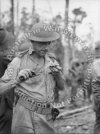Actually, there's been quite a bit written about edged weapon use over the course of the centuries. And the material is available. You just need to study and learn

First, don't confine yourself to "here and now" track. Broaden your horizons and seek out those Works written on various conflicts and wars to include European and religious. Jim Keating has an incredible library spanning wars, schools, teachings, and so on regarding the use and application of bladeware, for example. He had to search these out, but his knowledge base and understanding grew with each book he obtained and read. Follow Jim's example. Forums in cyber world are interesting but temporary. Study and learn. That takes WORK.
You would find the WW2 Pacific campaign helpful. Hand to hand during that campaign against the Japanese was constant. Bladeware of every catagory came into play. It was so commonplace it became commonplace. However, the various truly good personal accounts of battles fought will offer nuggets of gold on this subject. Korea offers the same, and so on.
In Fighting Knives we published a number of stories from folks to include Vietnam spec-ops vets on bladework and training. Again, nuggets of gold. Andy Prisco's company, American Tomahawk, is based on the real world accomplishments of Peter LaGana, combat veteran and designer / maker of the VN Tomahawk...which was so designed specifically for use in Vietnam and many servicemen bought and carried his 'hawks for self defense. We still do today, thanks to Andy!
Paladin Press offers a number of good books and videos on bladework. Their authors and producers provide information on film and in print that they've learned from the masters, and / or developed from their own experiences, training, education, and sharing with others. These are modern day bladesmen whose feet are rooted in the work and experiences of Bladesmen Past...study and learn from them.
It's all out there and in impressive amounts. You just need to get creative and embrace the search.

